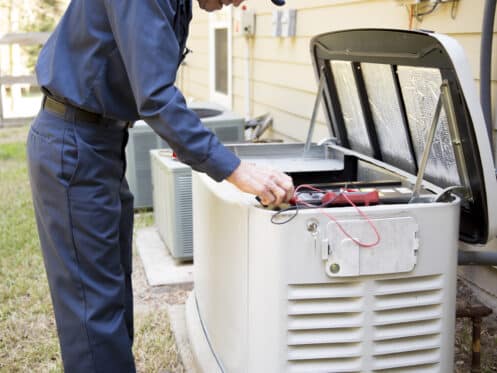Power outages cause inconvenience, discomfort, and safety risks. The inability to cook a meal, take a shower, or provide lighting to prevent slips and falls makes living in the dark unpleasant. Generators take away those risks and inconveniences. A home generator can enable people to remain comfortable during storms or any other time an electrical outage occurs. Here is what all homeowners should know about the use and benefits of generators.
Generator Options Vary
Homeowners can select from various generator models, but most have limited power or require the user to be on-site to start the system. Portable versions provide some backup power for a home during an emergency. Small, lightweight units produce minimal electricity that power a light or run a few small appliances. Most homeowners want something capable of keeping the lights and refrigerator running while also powering a water heater and a heating or cooling system. These needs require a more advanced generator.
The best option for powering a home is a standby generator. The units have a similar look and size to an exterior air conditioning unit. Like an AC unit, standby generators sit outside the home. The systems require professional installation from an electrician, so they are available whenever an outage occurs.
Some generator brands now include Wi-Fi connectivity that enables you to monitor the system through an app. You receive notices anytime the system becomes operational. The connectivity also provides maintenance notifications if something goes wrong with the unit or when it is time to perform specific maintenance tasks.
You can choose the generator size based on personal needs or preferences. Some people want a generator large enough to provide a few lights and keep their appliances functional. Others choose larger units that can keep their homes operating fully. The size needed will depend on these preferences as well as the size of the home.
Installation Options Exist
At Hunt’s Services, our licensed electricians install it by directly connecting it to a transfer switch in the home electrical panel. You can decide to have it automatically turned on or require manual operation.
If automatic, its connection to the electrical system enables sensors within the generator to detect an outage and begin operation. Most auto-start systems have a short delay before turning on. The few minutes between the start of the outage and the generator turning on enable the engine to warm up for use and prevent the system from operating every time the lights flicker.
Standby units use either natural gas or liquid propane fuel sources for operation. The fuel source converts to electricity for the home. The electrician can connect the unit to an existing gas line during the installation.
Standby units have emergency switches. The switch enables the homeowner to shut down the unit if needed. Another consideration is installing an in-house surge protector. The protective device can help avoid any damage to the unit if a power surge occurs when an electrical outage ends. You do not have to install the safety feature to use your generator, but doing so can protect the equipment. You can install an emergency switch at the same time as the generator if one is not already in the home, or you can add it at any time afterward.
Monitoring Is Beneficial
You must regularly monitor fuel levels because a standby system cannot operate without adequate fuel. Walk around the unit weekly to ensure the equipment and the surrounding area is clear of debris. Check for any signs of rodents and other pests nesting in the system. Remove any found, or contact a pest control service immediately for this purpose.
Experts recommend manually starting the system weekly or at least every few weeks. Starting and operating the generator for a few minutes will keep the parts lubricated and ready for use. Some units are programmable to perform this step alone and can send a notification when it occurs. The updates will also detail any concern that prevented the startup. Always inspect the unit after a storm to ensure the equipment does not experience any damage.
Maintenance Is Necessary
Some Tacoma homeowners may want to perform all maintenance and repairs to a standby generator. Warranty coverage usually only continues when a certified technician manages the task. Most experts recommend an annual maintenance check or a service appointment after every 200-400 hours of use. At Hunt’s Services, we can schedule maintenance inspections for your standby generator based on your average use or preference.
Annual maintenance improves system performance and lifespan, so it includes a lengthy list of tasks:
- Oil change
- Replace oil filter
- Inspect cooling system
- Check coolant levels
- Clean air filter
- Replace spark plugs
- Inspect for leaks
- Lubricate components
- Inspect belts, hoses, connectors
- Test battery
- Inspect engine
- Check all wiring
- Inspect alternator
Other steps will include testing the unit’s electrical system, inspecting the transfer switch, and checking the control panel. A test run of the transfer switch ensures the system starts and runs appropriately. During annual maintenance, a thorough cleaning inside and outside of the system and an overall visual inspection will ensure it is ready for any weather event.
Additional Important Details
Standby generators cost more than many other backup power sources because of their quality, reliability, and the amount of power produced. Tacoma-area residents continue to have heightened outage risks throughout the year, so the investment can improve comfort and security and provide peace of mind. Investment in a generator can also benefit homeowners if they decide to refinance or sell their homes. The emergency backup systems boost home value by approximately 5%-10%. They can also make the property more desirable to buyers.
Providing more emergency backup power to a home means investing in a more powerful generator. Generators that produce more electricity will also make more noise. The average standby generator, however, is less noisy than most portable units. Standby generators typically operate at about the same decibel level as an air conditioner. The noise will not exceed allowable levels in urban or suburban neighborhoods and should not disturb nearby neighbors.
Standby systems can last 20 years or approximately 1,500-3,000 hours of use. To achieve this longevity requires the owner to have the system installed correctly and maintained as suggested. The exact length of time you can depend on the unit will vary based on the brand of system purchased, the maintenance the generator receives, and your frequency of use. Warranties on the systems typically range from 2-10 years and require the owner to receive all manufacturer-recommended maintenance for eligibility.
Get Reliable Assistance
At Hunt’s Services, we can help any Tacoma-area homeowner find the backup generator that meets their needs. We can help you select the correct size and provide any installation and maintenance services you may need. We also offer help with your HVAC, plumbing, and sewer and drains. Our team of experienced and licensed electricians can assist homeowners with the care and use of their systems to ensure they have the information necessary to keep themselves and their families safe.
Contact Hunt’s Services today to learn more about our standby generators.




